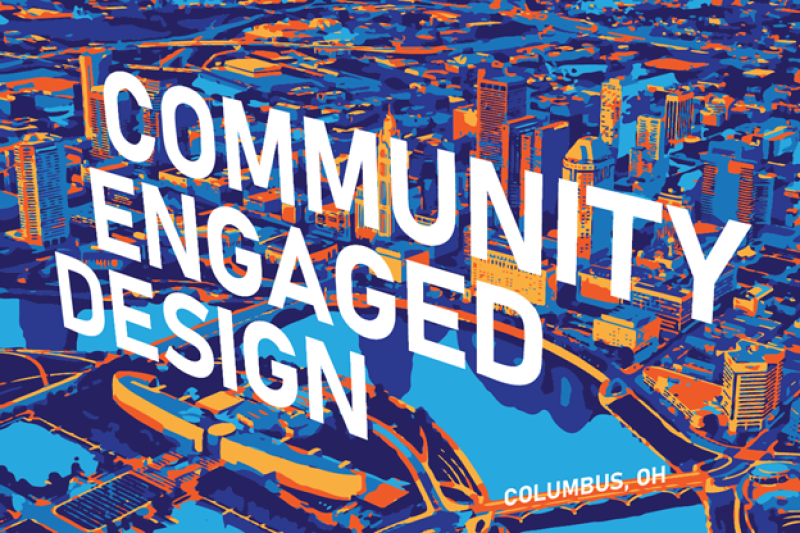Community-Engaged Design

Community-engaged design starts with community, either place-based or as a group of people brought together by common cause.
Community-engaged design integrates design processes, community participation, and social responsibility to address real-world challenges and promote positive change while placing an emphasis on collaborative creativity and ethical principles of engagement. In community engaged design, designers (including design students and educators) work closely with individuals, groups, and organizations to identify and understand local needs, aspirations, and issues. Through active collaboration and dialogue, the design process becomes a collective effort where diverse perspectives and knowledge are valued. This model of designing encourages empathy, cultural competency, and a critical understanding of social, economic, and environmental contexts. It relies on critical thinking, problem-solving, and communication skills while fostering creativity and innovation.
Keywords
Community engagement; Community-engaged design (CEnD); Design build; Community-engaged research (CEnR);
Community based participatory research (CPBR)
Advising Team
Current Students Working on the Project
Profile Description and Preferred Qualifications
- Candidates must have experience engaging with a community that is not their own
- Candidates must enjoy being and working with others
- Candidates must demonstrate critical self-awareness
- Preference for candidates to have design experience or formal design training
Relevant Journals
Design Studies
Design Issues
She Ji
Relevant Publications
Barcham, M. (2022). Decolonizing public healthcare systems: Designing with indigenous peoples. She Ji: The Journal of Design, Economics, and Innovation, 8(4), 454–472. https://doi.org/10.1016/j.sheji.2022.10.004
Cipolla, C. (2018). Designing for vulnerability: Interpersonal relations and design. She Ji: The Journal of Design, Economics, and Innovation, 4(1), 111–122. https://doi.org/10.1016/j.sheji.2018.03.001
Costanza-Chock, S. (2020). Design justice: Community-led practices to build the worlds we need. MIT Press.
Huybrechts, L., Dreessen, K, & Hagenaars, B. (2018). Building capabilities through democratic dialogues. Design Issues, 34(4), 80–95. https://doi.org/10.1162/desi_a_00513
Hyysalo, V., & Hyysalo, S. (2018). The Mundane and strategic work in collaborative design. Design Issues, 34(3), 42–58. https://doi.org/10.1162/desi_a_00496
Lenskjold, T. U., Olander, S., & Halse, J. (2015). Minor design activism: Prompting change from within. Design Issues, 31(4), 67–78. https://doi.org/10.1162/DESI_a_00352
Melsop, S. (2019). Pedagogical strategies for social impact design: Designing with the PopRua. In Cumulus Conference Proceedings, Bogota, Columbia 2019.
Nickley, W. (2021). Practices of making: Exploring design-based making within Positive Youth Development. In M. Botta, & S. Junginger (Eds.), Design as common good: Framing design through pluralism and social values, 1086–1106. SUPSI, HSLU, swissdesignnetwork. https://designascommongood.ch/
Phillips, R., & Abbas-Nazari, A. (2022). Fostering natural world engagements: Design lessons and issues from the my naturewatch training program. Design Issues, 38(2), 47–63. https://doi.org/10.1162/desi_a_00681
Proulx, S., Melsop, S. Caution Roadblocks Ahead! Hosting a Design Driven Social Innovation Lab in a Research-Intensive University in Cumulus Conference Proceedings Paris 2018.
https://cumulusassociation.org/wp-content/uploads/2021/09/CumulusConferenceProceedings_Paris201
_Pages-compressed.pdf
de la Rosa, J., Rueker, S., & Nohora, C. G. (2021). Systemic mapping and design research: Towards participatory democratic engagement. She Ji: The Journal of Design, Economics, and Innovation, 7(2), 282–298. https://doi.org/10.1016/j.sheji.2021.04.001
Relevant Community Engaged Design Work
Overview by Surdna Foundation
Design Matters in Brazil
Design Matters with TRANSIT ARTS
Voices of Franklinton
CoDe Rainbow
Local Tech Heroes
